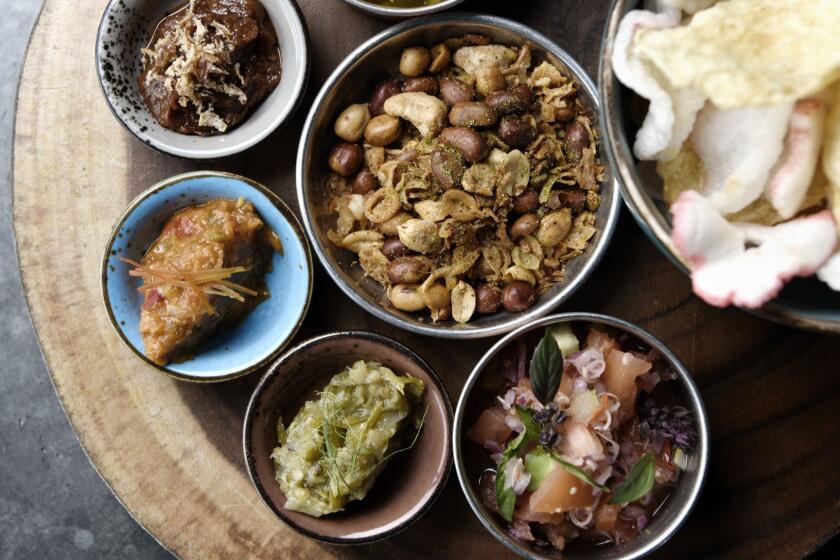Is Indonesian food finally having its moment in Los Angeles?
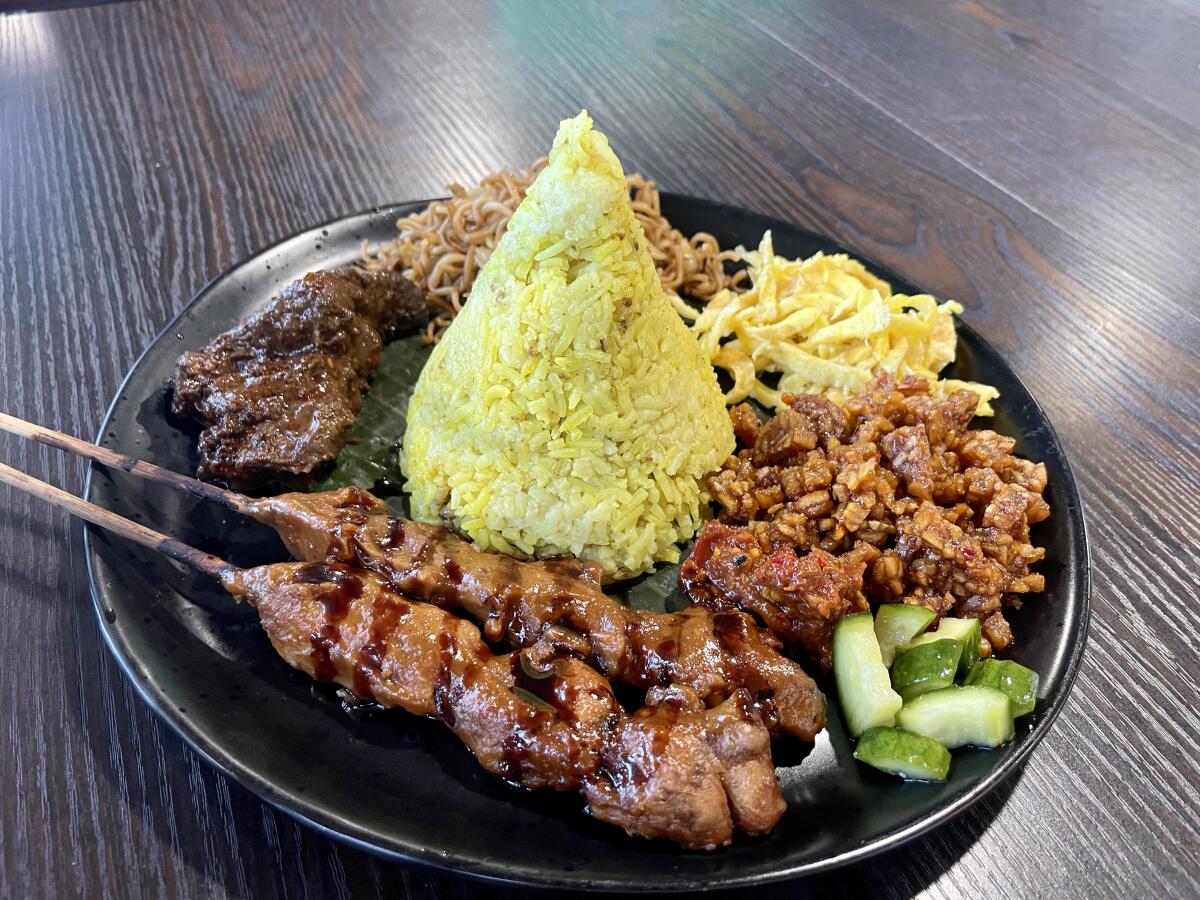
- Share via
My best friend from high school is from Jakarta, Indonesia. She used to complain about the lack of Indonesian food in Los Angeles, with only a handful of options. We had Malaysian. Plenty of Chinese. But no one, she said, was cooking the rendang, nasi goreng and sambals she treasured back home.
We were able to source most of the ingredients she needed to cook her favorites from 99 Ranch Market. But the dishes were labor-intensive, and we were more concerned with which boys were asking us to the winter formal than with spending six hours on beef rendang.
When Simpang Asia market added a small cafe to its operation in 2005, we were both in college. We met at the Palms restaurant for banana leaf-wrapped nasi bungkus and bowls of soto betawi.
Indonesian cuisines thrive at houses of worship in L.A., where cooks share their prized dishes via webs of WhatsApp messages.
We always hoped that Indonesian food would find its footing in Los Angeles. Though Simpang Asia has since opened a second location in Venice, other Indonesian favorites such as Indo Cafe and Ramayani have closed.
With the recent openings of Wayang Restaurant in the San Gabriel Valley and LaaLaaPan in Woodland Hills, it’s time Indonesian food had its moment in Los Angeles.
Nasi tumpeng mini and nasi goreng pete from LaaLaaPan
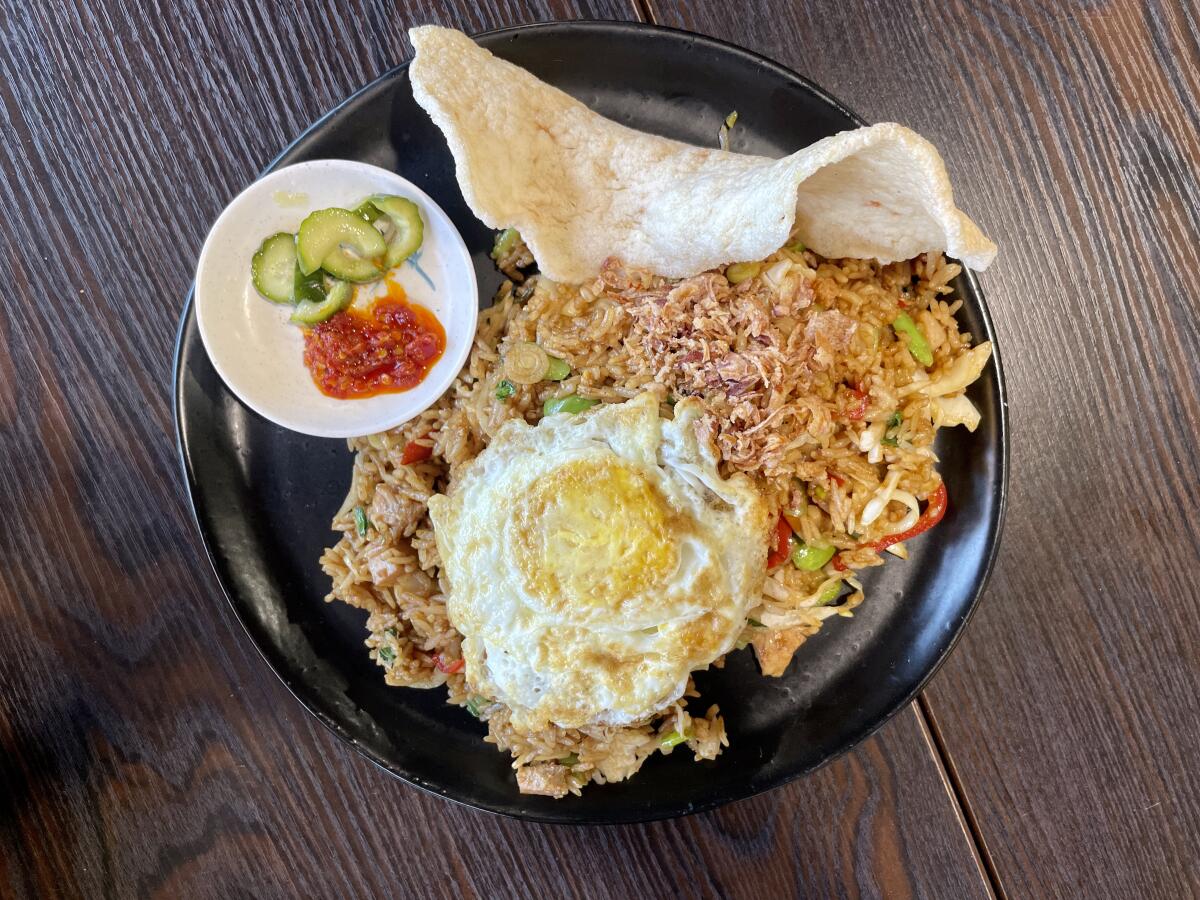
“It’s so much work just for the rice,” Lili Wnahyu said, shortly after the lunch rush at her Woodland Hills restaurant. “That’s why there’s not a lot of Indonesian restaurants here. Because to create just one ingredient of one dish takes so many steps.”
Maybe she’s right, but it didn’t stop her from opening LaaLaaPan in a Ventura Boulevard strip mall in June. Originally from North Jakarta, Wnahyu grew up watching her grandmother cook at her restaurant there. When she moved to the United States in 2011, she started a small catering operation serving Indonesian college students in Seattle.
“My dream was always to open an Indonesian restaurant, inspired by my grandma,” she said.
She makes her nasi goreng like her grandmother did, studded with wonderfully bitter sator beans that look like chopped green olives in the rice. The grains are slick with Indonesian sweet soy sauce, and mostly flavored with garlic and the earthy, nutty taste of candlenut, which Wnahyu uses as the base for many of her dishes. The rice is embellished with slivers of cabbage, peppers and diced chicken.
The sambal sampler at Kasih (pronounced kah-see), an Indonesian kitchen that opened last spring in Little Tokyo, is an impressive spread: a still life of tiny serving spoons, chile dips, Indonesian crackers, the pickled veggie salad called acar, and a trail mix snack bowl filled with crunchy peanuts, bits of fried shallots and spiced candied cashews.
It’s piled onto a platter, enough to easily feed a family of four, and topped with a fried egg. Nestled alongside is what might be the largest shrimp chip in the universe and a ramekin with pickled cucumber and a garlic-heavy sambal, so you can control the heat.
Order the nasi tumpeng mini too, a sort of combo plate with the menu’s greatest hits. A tower of turmeric coconut rice sits tall in the middle, surrounded by a scoop of beef rendang, two skewers of chicken sate with peanut sauce, a tangle of stir-fried noodles, strips of an egg omelet, orek tempeh, some pickled cucumbers and a dollop of sambal.
The peanut sauce acts as a thin glaze on the skewers. The rice is cooked with coconut milk, turmeric, lemongrass and coriander. It’s intended as a vessel for the rendang and other elements on the plate, but it could easily be its own dish.
The sambal is different from the one that accompanies the nasi goreng. This one is darker in color, with a strong bouquet of shrimp paste. Just a smidge adds a hit of heat and funk to anything it touches.
The orek tempeh may be the most compelling dish. Wnahyu cuts the fermented soybean cakes into tiny squares and deep-fries them. Then she cooks them in a mixture of sugar, chile, tomato, onions and soy sauce. The combination of ingredients acts as a binder for the tempeh, fusing the pieces together into what looks like shards of nut brittle.
It’s salty, sweet and not quite crunchy. The texture and flavor is at once familiar and foreign. A bar snack or stir-fry depending on which utensil you use to eat it, and your mood.
Nasi kuning komplit and ayam kremes with penyet sambal from Wayang
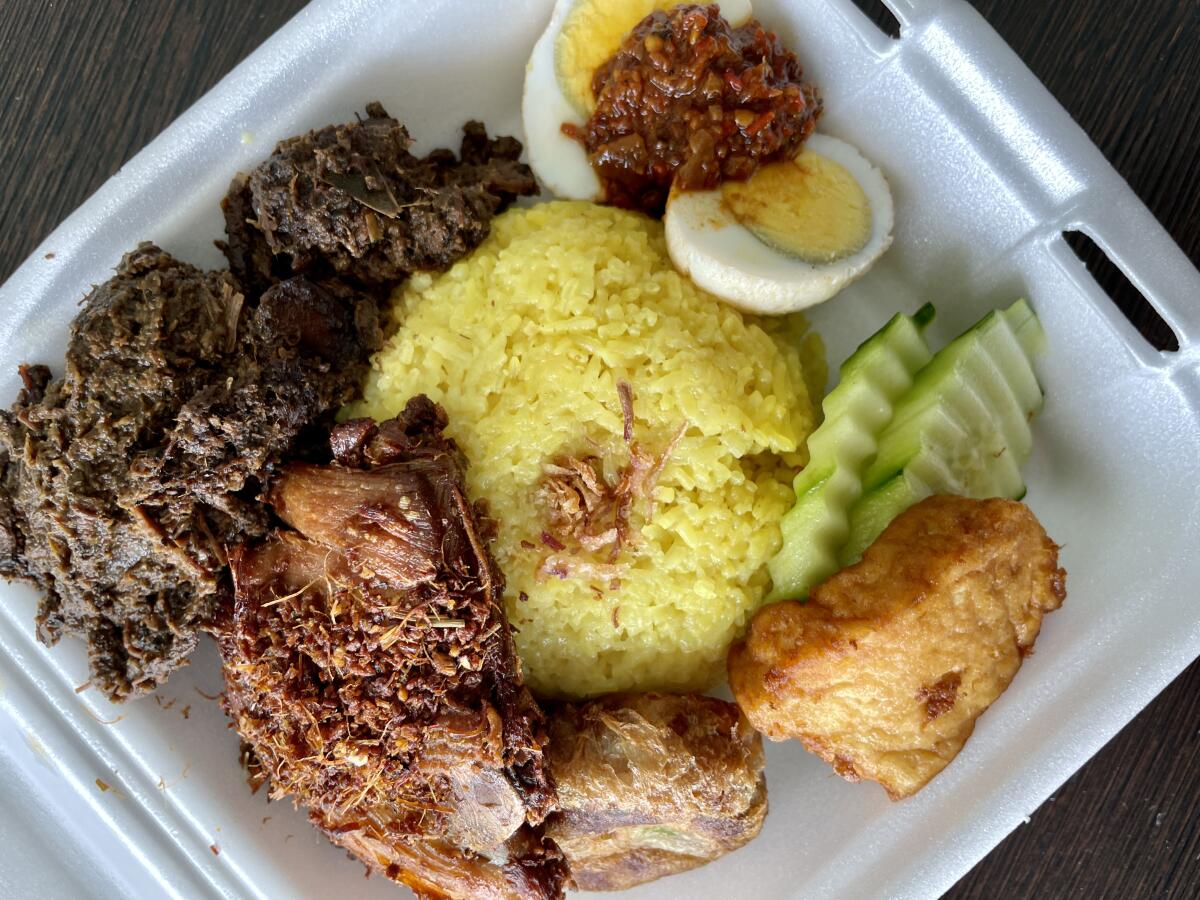
I’m prefacing this next recommendation with a plea for patience. Kadar Wati (also known as Lily) runs a mostly one-woman show at Wayang, a small Indonesian restaurant in Alhambra.
In mid 2021, she took over the Wong Java House. After months of waiting for the paperwork to be approved for a name change, she reopened the restaurant as Wayang Restaurant in November.
Most days, it’s just her in the kitchen. She preps her beef rendang, which takes around six hours, herself. The six sambals that accompany her various rices, noodles and stews are all made by her hands. She’s the one who will be taking your order. Depending on the time of day and who got there before you, she may not have time to make your food. Or it might take longer than expected.
Awan ice cream is the newest outlet for chef Zen Ong’s love for Indonesia.
“I feel so bad that it takes me so long,” she said after a recent visit. “I pray for the people who come in. They are hungry already and I don’t want to disappoint them.”
A private celebrity chef for years before opening the restaurant, she opened Wayang after deciding to adopt children from Indonesia. She hoped owning her own business would help her better support her children.
She’s looking to hire more staff. But in the meantime, have patience and order ahead online.
Wati’s rendang is worth the wait. It’s the star of her nasi kuning komplit, a plate of rendang, fried chicken, turmeric rice, a potato and corned beef fritter, fried tofu and a hard-boiled egg smothered with sambal balado.
She learned to cook rendang from her mother, who had a restaurant in Indonesia. Wati makes a paste with shallots, garlic, chile, bay leaf, turmeric leaf, lemongrass, star anise, clove, cinnamon and mustard seed. She toasts shredded coconut until it’s dry, then grinds it into a powder and adds it to the mixture. She combines everything with coconut milk, adds the meat and lets it all cook down around six hours. The meat bathes in the sauce, breaking down until the two become one.
The rendang throbs with lemongrass, cinnamon and lime leaf. There’s a warmth there, but it’s not exactly hot. Wati, who is from central Java, says her food is on the milder side by design but that she’ll dial up the heat for customers from Eastern or Western Java, who prefer more chile.
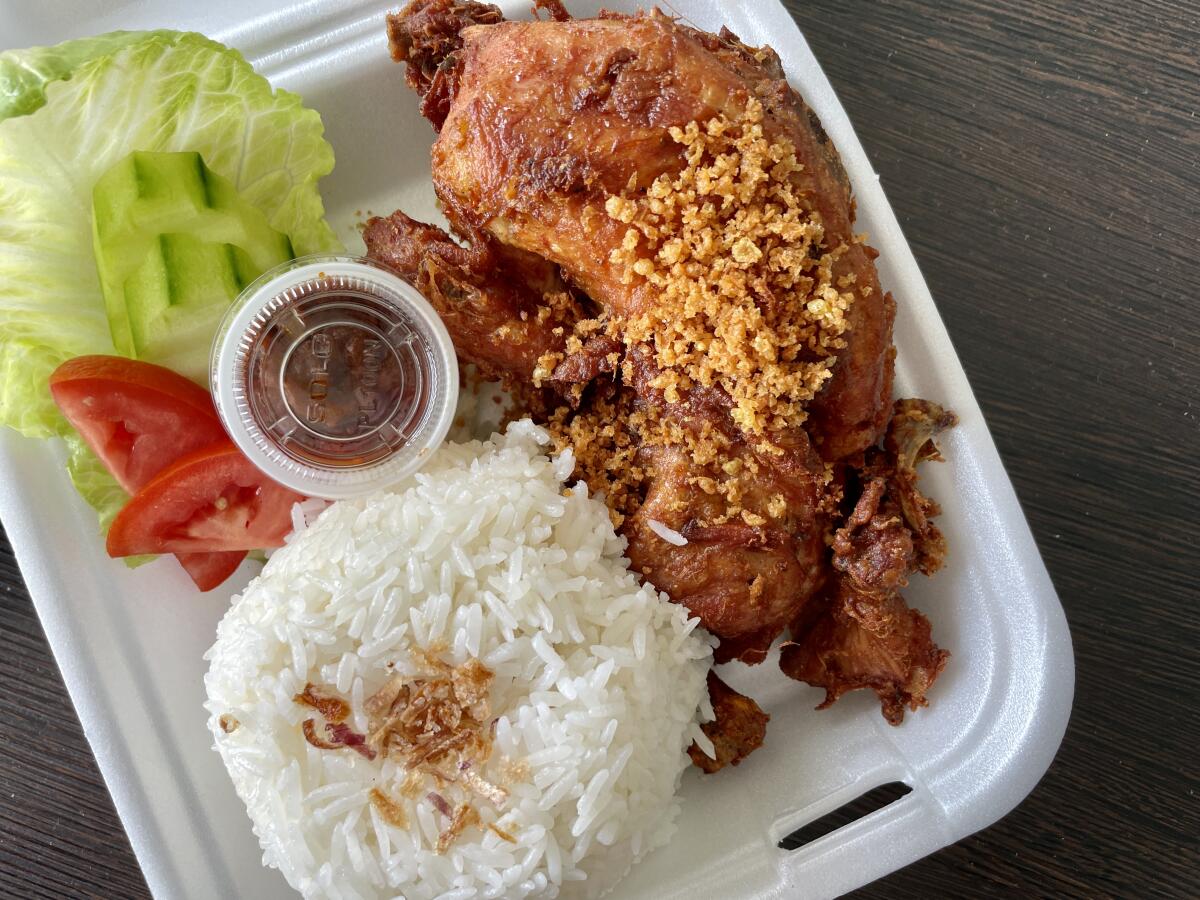
Her ayam kremes, fried chicken with sambal, is also a favorite. She marinates the chicken in ground candlenut, ginger, galangal, lemongrass, coriander and lots of garlic. It’s fried with the herbs and spices still clinging to the skin, creating a crunchy, jagged coating of the various components. One bite might have a bit of smashed lemongrass, another a zip of ginger. She tops the chicken with bits of fried garlic that taste like candy.
The sambal accompanying the chicken is rust red in color, made with chiles, shallot, garlic, tomato and shrimp paste. It’s great for dipping, or to eat on its own with a scoop of rice.
Where to find Indonesian food
LaaLaaPan, 19948 Ventura Blvd., Woodland Hills, (714) 319-4729, laalaapan.com
Wayang, 1936 W. Valley Blvd., Alhambra, (626) 289-2717, wayangrestaurant.com
More to Read
Updates
9:22 a.m. Aug. 8, 2023: This article was updated to include Kadar Wati’s more common name Lily and to include the full dish name for the Ayam Kremes with penyet sambal at Wayang Restaurant.
Eat your way across L.A.
Get our weekly Tasting Notes newsletter for reviews, news and more.
You may occasionally receive promotional content from the Los Angeles Times.

